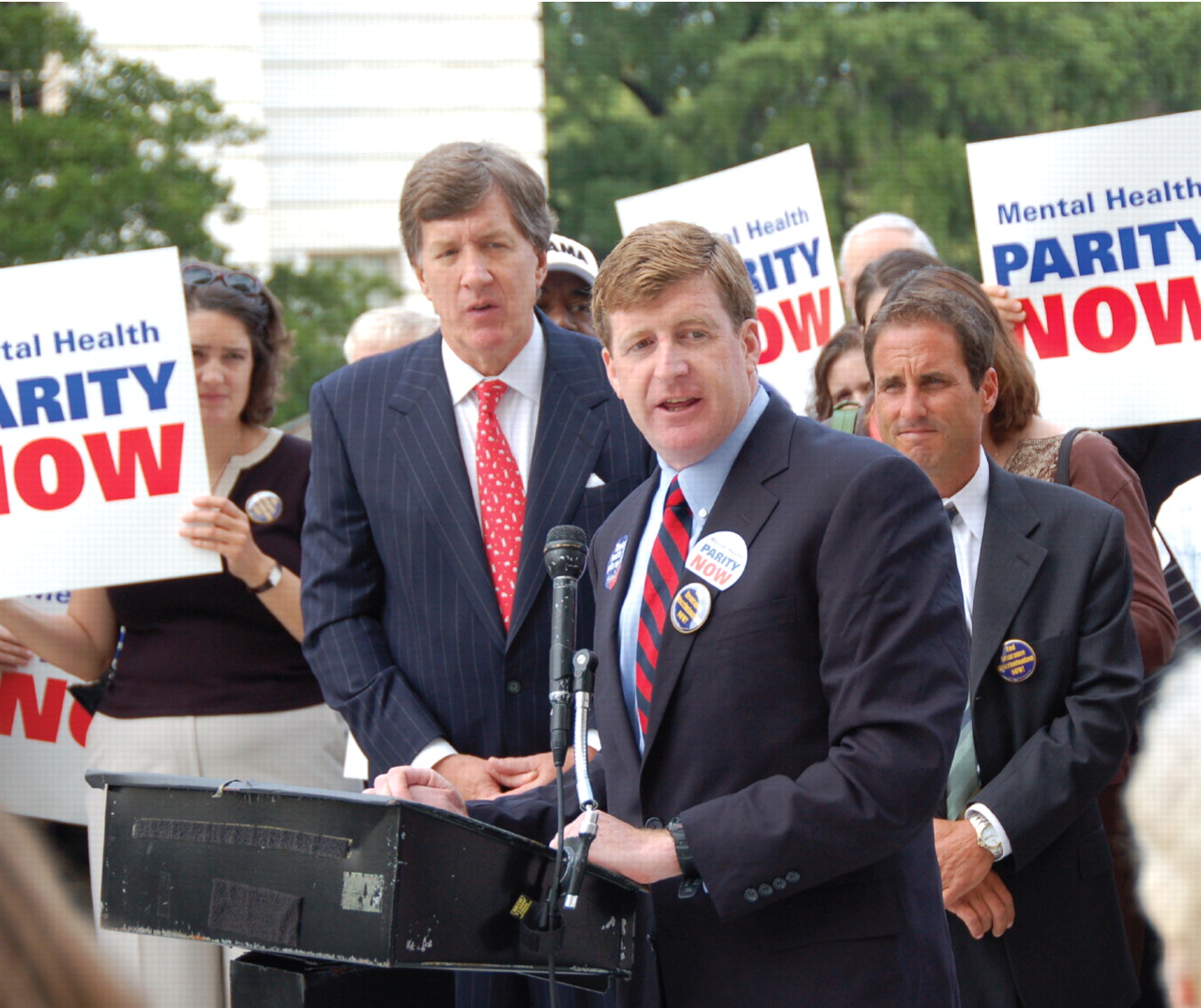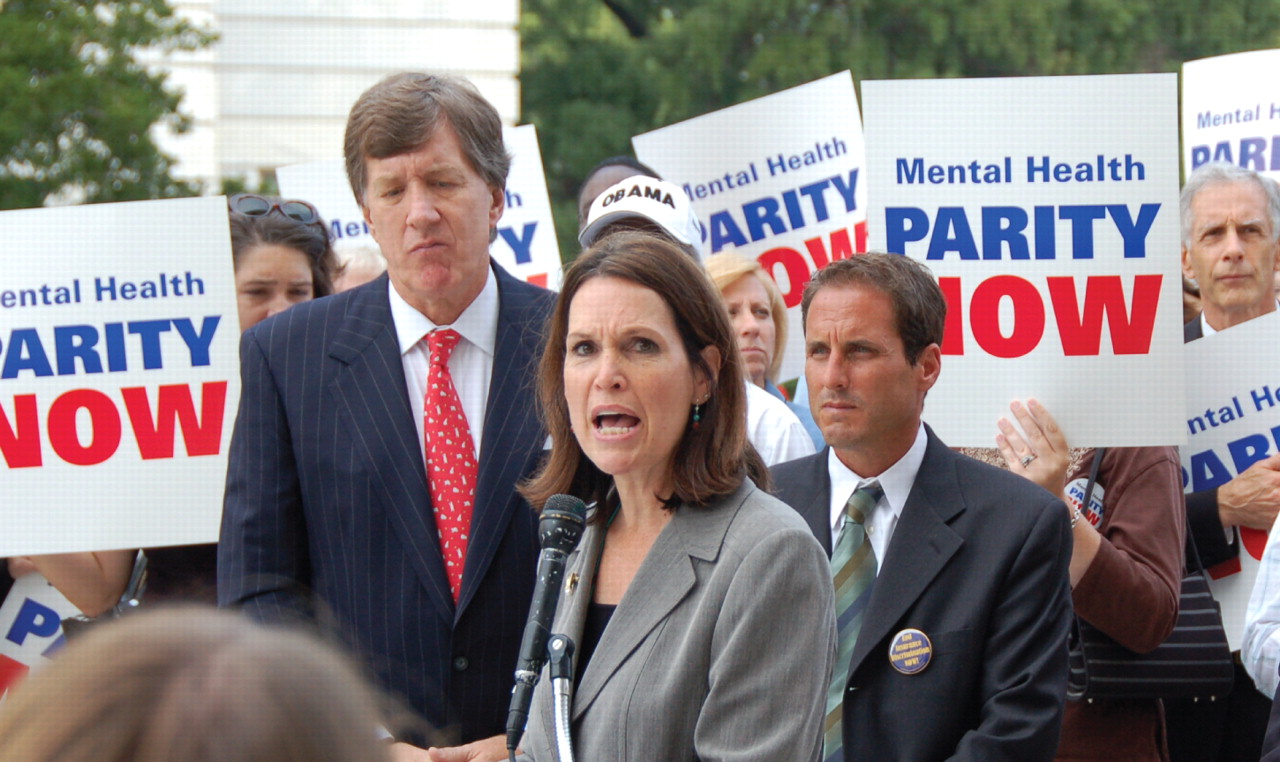Mental Health Parity Enacted After Years of Hard Work
Supporters of parity legislation rallied on Capitol Hill September 19 as part of an all-out effort to encourage Congressional leaders to vote on a compromise parity bill before lawmakers headed home to campaign for reelection. Two weeks later, Congress did just that, and a historic milestone for people with mental illness was reached.

Rep. Patrick Kennedy (D-R.I.) speaks at a Capitol Hill rally for mental health parity last month. In the waning days of Congress, Kennedy led a push for passage of a bipartisan insurance parity compromise. With him are Rep. Jim Ramstad (R-Minn., left) and Dave Wellstone, son of the late Sen. Paul Wellstone, a longtime advocate for people with mental illness.
Credit: Rich Daly
The parity measure, passed by Congress as part of the massive financial industry rescue package (HR 1424), requires health plans that offer mental health coverage to have the same benefits, copayments, and treatment limits as other types of health care. The law, which does not preempt more stringent state parity laws, goes into effect a year from now.
“This is a tremendous victory for the APA leadership and Assembly, our grassroots activists, and all APA members and staff,” said Nicholas Meyers, director of APA's Department of Government Relations. “It is most particularly a victory for patients and their families across the country.”
The weekend after the bill was signed, APA's Board of Trustees was meeting in Chicago and celebrated the good news. Commented APA President Nada Stotland, M.D., “The Board passed a resolution thanking the APA staff who have spent well over 10 years working to eliminate insurance discrimination against our patients and thanking the members of the House and Senate who have supported this bill. We still have challenges ahead, but this is another important step out of the dark ages.”
The title of the parity portion of the new law is the Paul Wellstone and Pete Domenici Mental Health Parity and Addiction Equity Act of 2008. Domenici (R-N.M.) and Wellstone (D-Minn.) were early supporters of mental health parity and reached across the aisle to promote it. Both knew the devastating impact—financial as well as emotional—on families with a mentally ill relative. Under the leadership of Domenici and Wellstone, and with strong advocacy efforts by groups such as APA, Congress passed the first federal mental health parity law in 1996. It mandated parity coverage between mental and physical disorders in lifetime and annual dollar limits. Wellstone was killed in a plane crash in October 2002.
APA is a leading member of the Mental Health Liaison Group, whose 200 affiliated organizations had been urging their members to contact their members of Congress throughout September as the parity measure moved close to final passage several times before being caught up in higher-profile issues.
“It's now or never for me, but more importantly it's now or never for the millions of people with mental illness who need insurance parity to get the care they need,” Rep. Jim Ramstad (R-Minn.) told Psychiatric News after the Capitol Hill rally.
The parity measure was among several that were added to the economic stimulus relief bill to entice support when the original bill narrowly failed to pass the House. One member who was swayed by its inclusion was Ramstad.
“The inclusion of our mental health parity bill, major tax relief, and bank deposit (FDIC) insurance increases caused me to reconsider my position,” Ramstad said in a written statement.

Rep. Betty McCollum (D-Minn.) joined other mental health insurance parity advocates at a rally last month urging Congress to pass compromise bipartisan legislation requiring insurers to provide coverage of psychiatric and substance use treatment equal to that for other medical conditions.
Credit: Rich Daly
The new law spells out two conditions under which businesses do not have to provide mental health parity coverage. Businesses with fewer than 50 employees are exempt. Also, businesses that incur an increase in “total cost of coverage” with respect to medical and surgical benefits and mental health and substance-related disorder benefits of more than 2 percent in the first year that parity goes into effect or more than 1 percent in any subsequent year can seek an exemption for the following plan year. Plans may determine costs after the first six months of compliance.
Major mental disorders cost the nation at least $193 billion annually in lost wages, while the costs of alcohol and drug problems are over $400 billion, supporters said.
Leading the charge in the House of Representatives for final passage of parity was the sponsor of the House bill and long-time mental health advocate, Rep. Patrick Kennedy (D-R.I.).
“Today's final passage of legislation to ensure mental health and physical health benefits are treated equitably is a remarkable achievement,” Kennedy said in a written statement after passage.“ It clearly demonstrates that by bringing researchers, health care providers, businesses, patients, and advocates together to work collaboratively, you can make great strides in public health policy.”
Kennedy said the measure will help ensure that 113 million Americans will have the same access to mental health and substance abuse health benefits as they do to other health benefits.
The text of the parity legislation can be accessed at<http://thomas.loc.gov> by searching on the bill number of the emergency economic stabilization package, HR 1424. ▪



